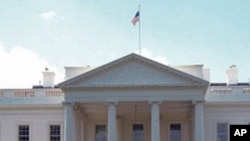President Barack Obama and Republican Senator John McCain, have had their first face-to-face meeting at the White House since the 2008 presidential election. The two men discussed a range of topics in the Oval Office sit-down, including domestic political issues and foreign policy matters including the situation in Egypt.
The White House did not grant media access, even for still photographers, to Wednesday's meeting in the Oval Office, which also covered the situation in Egypt.
After the meeting, a McCain spokeswoman issued a statement saying he and the president had a "productive meeting on a range of issues" including the situation in the Middle East, immigration reform, trade and budgetary matters, and that the senator looks forward to "working with the president to address issues of mutual concern for the welfare of our country in these challenging times."
The relationship between Senator McCain and President Obama was frosty after the 2008 election, particularly in 2009 and into 2010 as Mr. Obama pressed ahead with his health care reform effort.
In a now famous exchange during a health care summit with Republicans hosted by Mr. Obama at Blair House, McCain accused the president and Democrats of failing to live up to promises of an open legislative process, bringing this response from the president.
McCAIN: "Treat all Americans the same under provisions of the law so they will know that geography does not dictate what kind of health care they receive."
OBAMA: "Let me just make this point, John, because we're not campaigning anymore. The election is over."
McCAIN: "I'm reminded of that every day."
As he fought off a fellow Republican challenger in the run-up to last November's mid-term congressional elections, Senator McCain criticized the president on everything from health care to government spending and the need to reform U.S. immigration policies.
In one occasion, McCain also appeared with his former vice presidential running mate on the 2008 Republican ticket, Sarah Palin, who has been sharply critical of Obama administration policies and played up McCain's self-described reputation as a "maverick" politician.
However, McCain has also defended Mr. Obama in the face of a range of allegations, correcting opponents of the president who challenged his personal background or accused him of trying to flout the U.S. Constitution.
A turning point in the Obama-McCain relationship appears to have occurred after the shootings in Tucson, Arizona which killed six people and left 13 others wounded, including a U.S. congresswoman.
Senator McCain was among lawmakers attending a memorial event for shooting victims, at which the president spoke about a need for more civility and less "politics, point scoring and pettiness."
In a commentary published in The Washington Post recently, McCain said he disagreed with many of Mr. Obama's policies, but called him a "patriot sincerely intent on using his time in office to advance our country's cause, " and "rejected accusations that [Mr. Obama's] policies and beliefs make him unworthy to lead America or opposed to its founding ideals."
One topic President Obama and Senator McCain may have also discussed Wednesday is the ongoing hot political issue of "earmarks", special spending lawmakers insert in pieces of legislation to benefit their districts, and which Senator McCain has long opposed.
Press Secretary Robert Gibbs noted that McCain was among those who stood and applauded when the president in his State of the Union Address vowed to veto legislation reaching his desk containing such special interest spending.
President Obama is likely to need McCain's help in coming months as he faces the need to work with Republicans who have narrowed the Democratic majority in the U.S. Senate, and have a strong majority in the House of Representatives.





